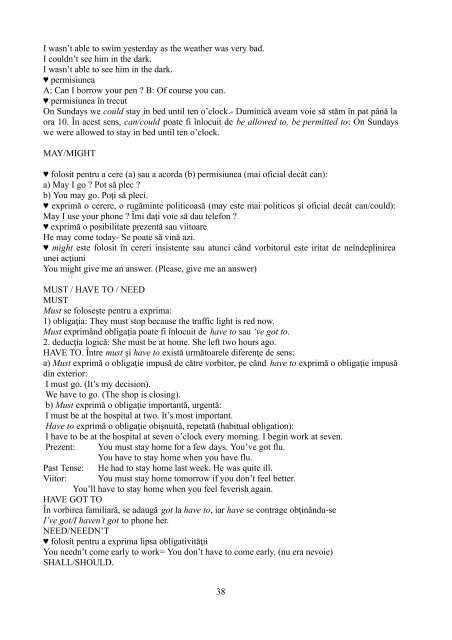Invata-Engleza-Fara-Profesor
Create successful ePaper yourself
Turn your PDF publications into a flip-book with our unique Google optimized e-Paper software.
I wasn’t able to swim yesterday as the weather was very bad.<br />
I couldn’t see him in the dark.<br />
I wasn’t able to see him in the dark.<br />
♥ permisiunea<br />
A: Can I borrow your pen ? B: Of course you can.<br />
♥ permisiunea în trecut<br />
On Sundays we could stay in bed until ten o’clock.- Duminică aveam voie să stăm în pat până la<br />
ora 10. În acest sens, can/could poate fi înlocuit de be allowed to, be permitted to: On Sundays<br />
we were allowed to stay in bed until ten o’clock.<br />
MAY/MIGHT<br />
♥ folosit pentru a cere (a) sau a acorda (b) permisiunea (mai oficial decât can):<br />
a) May I go ? Pot să plec ?<br />
b) You may go. Poţi să pleci.<br />
♥ exprimă o cerere, o rugăminte politicoasă (may este mai politicos şi oficial decât can/could):<br />
May I use your phone ? Îmi daţi voie să dau telefon ?<br />
♥ exprimă o posibilitate prezentă sau viitoare<br />
He may come today- Se poate să vină azi.<br />
♥ might este folosit în cereri insistente sau atunci când vorbitorul este iritat de neîndeplinirea<br />
unei acţiuni<br />
You might give me an answer. (Please, give me an answer)<br />
MUST / HAVE TO / NEED<br />
MUST<br />
Must se foloseşte pentru a exprima:<br />
1) obligaţia: They must stop because the traffic light is red now.<br />
Must exprimând obligaţia poate fi înlocuit de have to sau ‘ve got to.<br />
2. deducţia logică: She must be at home. She left two hours ago.<br />
HAVE TO. Între must şi have to există următoarele diferenţe de sens:<br />
a) Must exprimă o obligaţie impusă de către vorbitor, pe când have to exprimă o obligaţie impusă<br />
din exterior:<br />
I must go. (It’s my decision).<br />
We have to go. (The shop is closing).<br />
b) Must exprimă o obligaţie importantă, urgentă:<br />
I must be at the hospital at two. It’s most important.<br />
Have to exprimă o obligaţie obişnuită, repetată (habitual obligation):<br />
I have to be at the hospital at seven o’clock every morning. I begin work at seven.<br />
Prezent: You must stay home for a few days. You’ve got flu.<br />
You have to stay home when you have flu.<br />
Past Tense:<br />
Viitor:<br />
He had to stay home last week. He was quite ill.<br />
You must stay home tomorrow if you don’t feel better.<br />
You’ll have to stay home when you feel feverish again.<br />
HAVE GOT TO<br />
În vorbirea familiară, se adaugă got la have to, iar have se contrage obţinându-se<br />
I’ve got/I haven’t got to phone her.<br />
NEED/NEEDN’T<br />
♥ folosit pentru a exprima lipsa obligativităţii<br />
You needn’t come early to work= You don’t have to come early. (nu era nevoie)<br />
SHALL/SHOULD.<br />
38



